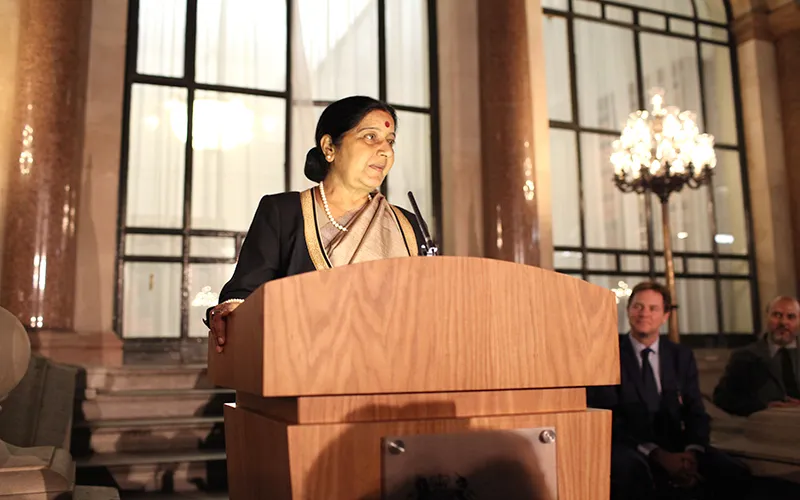"Indian External Affairs Minister Sushma Swaraj paid a visit to Egypt from 23-25 August, on the invitation of her Egyptian counterpart Sameh Hassan Shoukry. It marked the first official visit of an Indian dignitary to Egypt since Prime Minister Narendra Modi took office in May last year. She also met Egyptian President Abdel Fattah al-Sisi and secretary general of the Arab League, Nabil El Araby.
During her meeting with President Sisi, Swaraj emphasized on the need to discuss bilateral relations between India and Egypt with a focus on cultural relations, security, counter-terrorism and trade. President Sisi also expressed a desire to take India-Egypt relations to a ""higher level"". Two MOUs were agreed upon, pertaining to tourism, and scientific and technical cooperation. Foreign Minister Shoukry accepted an invitation to hold foreign office consultation at the Secretary level in November 2015. Swaraj also requested for his intervention in securing the release of six Indian seamen who have been detained in Egypt since February 2014.
The visit highlights a significant development in India’s engagement with Egypt, as well as an effort to deepen ties with Arab nations as part of the renewed Indian focus on West Asia. Diplomatic efforts in the field of counter-terrorism have been emphasized by both Swaraj and Sisi, pointing towards a shift in the way New Delhi has historically approached its relations with the Arab nation, with the traditional focus on trade and civilizational ties.
India is among the largest importers of Egyptian products, with crude oil being one of the key imports for the former. India is also one of the largest investors in Egypt, with around US $3 billion invested across more than 40 projects. Egyptian investment in India has also been significant in recent years. However bilateral trade has been affected by continuous domestic political turmoil in Egypt. According to estimates from the Ministry of Commerce in New Delhi, total bilateral trade has fallen from US $5.42 billion in 2011-12 to US $4.76 billion in 2014-15.
Despite the fact that India’s relations with Egypt have been bracketed by the former’s domestic energy concerns, as well as trade, a deeper rapprochement through tourism, science and technology, and counter-terrorism is to be welcomed.
The India-Egypt Joint Commission was set up in 1983 and has convened annually since then to discuss issues pertaining bilateral relations between the two countries. Since the 1980s, a number of high level visits have also given a boost to relations. Notable among these have been the four Prime Ministerial visits from India to Egypt: Rajiv Gandhi in 1983, P.V Narasimha Rao in 1995, I.K Gujral in 1997, and Manmohan Singh in 2009. Former Egyptian President Hosni Mubarak visited New Delhi in 2011, and President Mohamed Mursi followed in 2013. Former Egyptian Foreign Minister Ahmed Aboul Gheil’s visit in 2006 was also significant, with the Partnership Agreement between the two nations being signed. According to the official press release issued by the Ministry of External Affairs in New Delhi pertaining to Sushma Swaraj’s recent visit, an Agreement on Maritime Transport is also due to be signed by both parties.
Although the strength of historical and civilizational ties between the two nations have been identified as important in maintaining contemporary relations, a ’stagnation of old ties’ has reportedly been observed in recent years by foreign policy commentators. A renewal of relations with a mutual focus on fighting terrorism is especially important in this context, since both countries face a threat from the rise of the Islamic State.
The importance of India-Egypt relations can also be viewed in light of China’s increased engagement with countries in West Asia and North Africa. China and Egypt established a strategic partnership during former Egyptian President Hosni Mubarak’s visit to Beijing in 1999. A framework agreement between the two countries was signed in June 2015 towards the implementation of 15 projects worth US $10 billion. China has also carried out some military engagements with Egypt in recent years, pointing towards an overall strengthening of existing relations. Although Chinese dependence on Egyptian oil is not significant, crude oil from the latter is an essential import for India. New Delhi’s recent diplomatic efforts may therefore also be viewed in light of sustaining key relationships with West Asia through trade, as well as renewed focus on technological exchange and people-to-people contact through tourism.
Egypt also recognizes the importance of its relations with India. An Egyptian desire to continue dialogue and engagement was evident when President Sisi invited Prime Minister Narendra Modi to participate in the inauguration of the new Suez Canal. Indian Road Transport Highways and Shipping Minister Nitin Gadkari represented India at the inauguration which took place on 6 August, 2015.
India’s initiatives to deepen cooperation with Egypt come at a strategic time for both nations. As Egypt tries to come to terms with fighting a violent insurgency that has the potential to have far-reaching consequences for its domestic politics, India is now keen to look beyond trade and civilizational ties, towards defence and military cooperation. The focus on defence comes at a time when India is continually confronted with China’s increased influence in the region, as well as India’s own interest in fighting the rise of Islamic fundamentalism in West Asia. "
The views expressed above belong to the author(s). ORF research and analyses now available on Telegram! Click here to access our curated content — blogs, longforms and interviews.




 PREV
PREV


